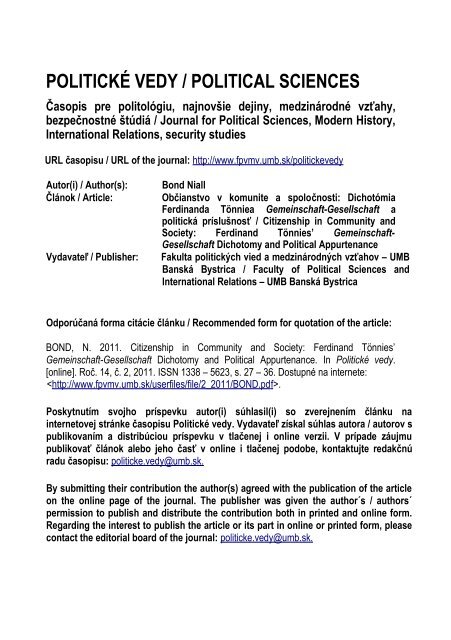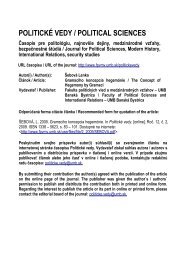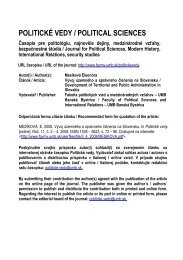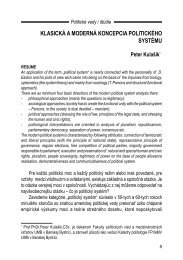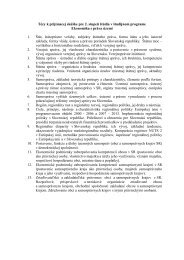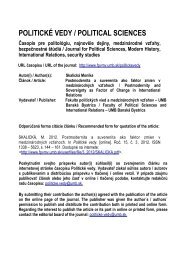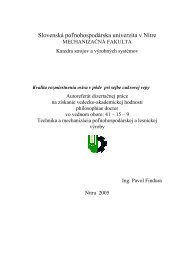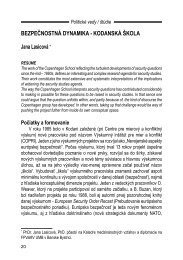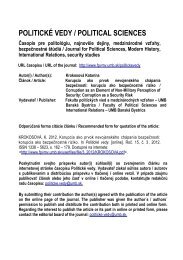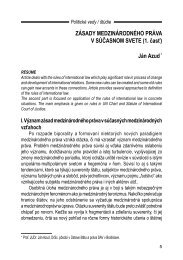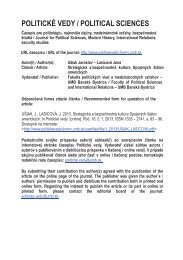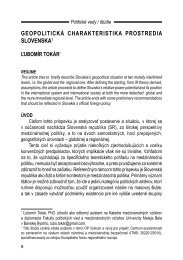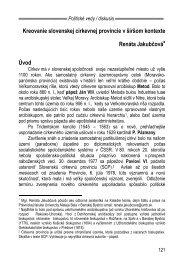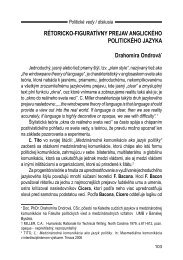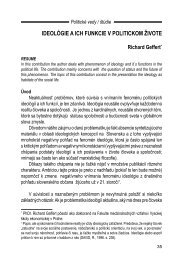Citizenship in Community and Society: Ferdinand ... - Politické vedy
Citizenship in Community and Society: Ferdinand ... - Politické vedy
Citizenship in Community and Society: Ferdinand ... - Politické vedy
You also want an ePaper? Increase the reach of your titles
YUMPU automatically turns print PDFs into web optimized ePapers that Google loves.
POLITICKÉ VEDY / POLITICAL SCIENCES<br />
Časopis pre politológiu, najnovšie dej<strong>in</strong>y, medz<strong>in</strong>árodné vzťahy,<br />
bezpečnostné štúdiá / Journal for Political Sciences, Modern History,<br />
International Relations, security studies<br />
URL časopisu / URL of the journal: http://www.fpvmv.umb.sk/politicke<strong>vedy</strong><br />
Autor(i) / Author(s):<br />
Článok / Article:<br />
Vydavateľ / Publisher:<br />
Bond Niall<br />
Občianstvo v komunite a spoločnosti: Dichotómia<br />
Ferd<strong>in</strong><strong>and</strong>a Tönniea Geme<strong>in</strong>schaft-Gesellschaft a<br />
politická príslušnosť / <strong>Citizenship</strong> <strong>in</strong> <strong>Community</strong> <strong>and</strong><br />
<strong>Society</strong>: Ferd<strong>in</strong><strong>and</strong> Tönnies’ Geme<strong>in</strong>schaft-<br />
Gesellschaft Dichotomy <strong>and</strong> Political Appurtenance<br />
Fakulta politických vied a medz<strong>in</strong>árodných vzťahov – UMB<br />
Banská Bystrica / Faculty of Political Sciences <strong>and</strong><br />
International Relations – UMB Banská Bystrica<br />
Odporúčaná forma citácie článku / Recommended form for quotation of the article:<br />
BOND, N. 2011. <strong>Citizenship</strong> <strong>in</strong> <strong>Community</strong> <strong>and</strong> <strong>Society</strong>: Ferd<strong>in</strong><strong>and</strong> Tönnies’<br />
Geme<strong>in</strong>schaft-Gesellschaft Dichotomy <strong>and</strong> Political Appurtenance. In Politické <strong>vedy</strong>.<br />
[onl<strong>in</strong>e]. Roč. 14, č. 2, 2011. ISSN 1338 – 5623, s. 27 – 36. Dostupné na <strong>in</strong>ternete:<br />
.<br />
Poskytnutím svojho príspevku autor(i) súhlasil(i) so zverejnením článku na<br />
<strong>in</strong>ternetovej stránke časopisu Politické <strong>vedy</strong>. Vydavateľ získal súhlas autora / autorov s<br />
publikovaním a distribúciou príspevku v tlačenej i onl<strong>in</strong>e verzii. V prípade záujmu<br />
publikovať článok alebo jeho časť v onl<strong>in</strong>e i tlačenej podobe, kontaktujte redakčnú<br />
radu časopisu: politicke.<strong>vedy</strong>@umb.sk.<br />
By submitt<strong>in</strong>g their contribution the author(s) agreed with the publication of the article<br />
on the onl<strong>in</strong>e page of the journal. The publisher was given the author´s / authors´<br />
permission to publish <strong>and</strong> distribute the contribution both <strong>in</strong> pr<strong>in</strong>ted <strong>and</strong> onl<strong>in</strong>e form.<br />
Regard<strong>in</strong>g the <strong>in</strong>terest to publish the article or its part <strong>in</strong> onl<strong>in</strong>e or pr<strong>in</strong>ted form, please<br />
contact the editorial board of the journal: politicke.<strong>vedy</strong>@umb.sk.
═════════════ Politické <strong>vedy</strong> / Studies ═════════════<br />
CITIZENSHIP IN COMMUNITY AND SOCIETY: FERDINAND<br />
TÖNNIES’ GEMEINSCHAFT-GESELLSCHAFT DICHOTOMY<br />
AND POLITICAL APPURTENANCE<br />
Niall Bond *<br />
RESUME<br />
We propose to present a paper on the application of Ferd<strong>in</strong><strong>and</strong> Tönnies’ conceptual<br />
dichotomy “Geme<strong>in</strong>schaft” <strong>and</strong> “Gesellschaft” to concepts <strong>and</strong> conceptions of citizenship<br />
<strong>and</strong> nationality. This reflection on the ultimate bases of appurtenance illum<strong>in</strong>ates possible<br />
<strong>in</strong>tentions beh<strong>in</strong>d the expression, “community” <strong>in</strong> the political constructs of the European<br />
Communities. Here, we propose to return to Tönnies’ work first to explore appurtenance to a<br />
common entity upon the basis of the Universalist natural law developed by Thomas Hobbes.<br />
Here, utilitarian anthropological assumptions underlie a quest for forms of governance with<br />
formal equality of appurtenance (Gesellschaft). Then we shall explore appurtenance based<br />
upon shared particularities rooted <strong>in</strong> blood, <strong>in</strong> soil <strong>and</strong> <strong>in</strong> time (Geme<strong>in</strong>schaft), <strong>in</strong> which<br />
cultural assimilation is a prerequisite <strong>and</strong> appurtenance is asserted by degrees accord<strong>in</strong>g to<br />
rootedness. The evolution of def<strong>in</strong>itions of “community” <strong>in</strong> the course of the twentieth<br />
century is related to the rise <strong>and</strong> fall of the attractiveness of Geme<strong>in</strong>schaft when compared<br />
with Gesellschaft. This shall be illustrated with reference to the thought of Dom<strong>in</strong>ique<br />
Schnapper. We shall conclude with an exploration of historical dist<strong>in</strong>ctions related to the<br />
debate on nationality <strong>and</strong> citizenship <strong>in</strong> Germany, with its specific term<strong>in</strong>ology of Staatsvolk,<br />
Volksgenosse, Staatsbürger, etc.<br />
Key words: <strong>Community</strong>, Utilitarian anthropology, Governance, Germany<br />
Introduction<br />
The dist<strong>in</strong>ction between old <strong>and</strong> new citizenship recalls the opposition<br />
between community (Geme<strong>in</strong>schaft) <strong>and</strong> society (Gesellschaft) elaborated by<br />
Ferd<strong>in</strong><strong>and</strong> Tönnies, an opposition based upon heterogeneous criteria. We<br />
po<strong>in</strong>t to seven logical dist<strong>in</strong>ctions <strong>in</strong> the dichotomy, before conclud<strong>in</strong>g on where<br />
Tönnies’ considerations lead us <strong>in</strong> an age of a new global logic of social<br />
appurtenances.<br />
* Dr. Naill Bond is an Associate Professor at the University of Lyon 2 <strong>in</strong> Lyon <strong>and</strong> Sa<strong>in</strong>t<br />
Etienne, France, e-mail: Niall.Bond@univ-lyon2.fr.<br />
27
═════════════ Politické <strong>vedy</strong> / Studies ═════════════<br />
<strong>Community</strong> as <strong>in</strong>timate mutual acqua<strong>in</strong>tance <strong>and</strong> society as<br />
anonymity<br />
“All trustful, <strong>in</strong>timate <strong>and</strong> exclusive life together (we f<strong>in</strong>d) is understood as<br />
life <strong>in</strong> community. <strong>Society</strong> is the public sphere, the world. One is bound to<br />
community with one’s ilk from birth, with all the benefits <strong>and</strong> drawbacks. One<br />
goes <strong>in</strong>to society as though one is go<strong>in</strong>g abroad” (Tönnies, 1979). Tönnies’<br />
very def<strong>in</strong>ition of community <strong>and</strong> society h<strong>in</strong>ges upon levels of <strong>in</strong>timacy <strong>and</strong><br />
knowledge <strong>in</strong> contrast to anonymity. Tönnies makes this knowledge the source<br />
of a natural law which accords participants rights <strong>and</strong> duties with<strong>in</strong> an order<br />
(Tönnies, 1979). Can such a dist<strong>in</strong>ction still be mobilised for a concept of<br />
citizenship In the narrowest underst<strong>and</strong><strong>in</strong>g of the town or polis <strong>in</strong> Tönnies’<br />
Geme<strong>in</strong>schaft, the small town, all <strong>in</strong>dividuals are deemed to be known to all the<br />
others. Yet <strong>in</strong> the national community of today, such knowledge is fictitious. In<br />
Imag<strong>in</strong>ed Communities, Benedict Anderson wrote that a nation “is imag<strong>in</strong>ed<br />
because the members of even the smallest nation will never know most of their<br />
fellow-members, meet them, or even hear of them, yet <strong>in</strong> the m<strong>in</strong>ds of each<br />
lives the image of their communion” (Anderson, 1991, p. 224). The sphere of<br />
<strong>in</strong>timacy of the mediatised political class is open to the manipulated scrut<strong>in</strong>y of<br />
voters who choose those members of the political class as their m<strong>and</strong>ated<br />
representatives with a view to the personal affects provoked among the citizenry<br />
when contemplat<strong>in</strong>g the political class. This <strong>in</strong>timacy, a symbolic stake of<br />
democracy at the national level, does not exist at that of the European Union,<br />
provok<strong>in</strong>g a sense of democratic deficit given the perception that the European<br />
political class lacks a fatherl<strong>and</strong> or natural community <strong>and</strong> consists of privileged<br />
grey functionaries. The move from the old citizenship of more restra<strong>in</strong>ed<br />
communities to the new citizenship of Europe may be seen <strong>in</strong> the move from a<br />
sense of common personal appurtenance to a sense of the derivation of rights<br />
<strong>and</strong> duties from abstract universals, or <strong>in</strong> the movement of power from political<br />
decision-makers engaged <strong>in</strong> discussion <strong>and</strong> entrusted with m<strong>and</strong>ates upon the<br />
assumption of shared values to impersonal forces of markets or <strong>in</strong>ternational<br />
<strong>in</strong>struments of law as faith shifts from the personal to the functional.<br />
<strong>Community</strong> as the particular, society as the universal<br />
Ferd<strong>in</strong><strong>and</strong> Tönnies describes the supplant<strong>in</strong>g of the particular by the<br />
universal. “Natural law” <strong>in</strong> the societal sense – freedom, ease <strong>and</strong> equality <strong>in</strong><br />
exchange – came to prevail, Tönnies wrote, “over the civil law of the Romans<br />
28
═════════════ Politické <strong>vedy</strong> / Studies ═════════════<br />
<strong>and</strong> of all political communities <strong>in</strong> ancient civilisation.” (Tönnies, 2002, p. 212)<br />
Tönnies refers to the attempt made by the Romans to establish a law “common<br />
to all nations”, follow<strong>in</strong>g Henry Sumner Ma<strong>in</strong>e’s description of Roman practice<br />
<strong>in</strong> Ancient Law: “Whenever a particular usage was seen to be practised by a<br />
large number of separate races <strong>in</strong> common, it was set down as part of the Law<br />
common to all Nations, or Jus Gentium” (Ma<strong>in</strong>e, 1878, <strong>in</strong> Tönnies, 2002, p.<br />
214). Tönnies translates jus gentium – mislead<strong>in</strong>gly, as Jose Harris observes –<br />
as “das geme<strong>in</strong>e Recht”, which translates literally as “common law”. This<br />
“geme<strong>in</strong>es Recht” led to dissolution, “thrown <strong>in</strong>to the melt<strong>in</strong>g-pot as a chemical<br />
reagent designed to dissolve all the widely vary<strong>in</strong>g subject matter <strong>in</strong>to the same<br />
basic elements” (Tönnies, 2002, p. 213). With the recognition that everyone<br />
should be able to form relationships with one another at will, those laws that put<br />
the <strong>in</strong>digenous <strong>in</strong> a position of privilege over the foreigners appeared to be<br />
arbitrarily erected barriers, “contrary to the dictates of nature” (Tönnies, 2002, p.<br />
215). Tönnies’ concludes that the “rule of Rome over the orbis terrarium…<br />
br<strong>in</strong>gs all cities closer to one city, <strong>and</strong> gathers together all the shrewd,<br />
barga<strong>in</strong><strong>in</strong>g, prosperous <strong>in</strong>dividuals, the entire rul<strong>in</strong>g elite of the boundless<br />
empire, all haggl<strong>in</strong>g together <strong>in</strong> the Forum. It erases their differences <strong>and</strong><br />
<strong>in</strong>equalities, gives them all the same outward appearance, the same language<br />
<strong>and</strong> form of expression, the same currency, the same culture, the same<br />
covetousness <strong>and</strong> the same curiosity” (Tönnies, 2002, p. 217). This process of<br />
the imposition of the societal underst<strong>and</strong><strong>in</strong>g of natural law found “its ultimate<br />
<strong>and</strong> crown<strong>in</strong>g expression <strong>in</strong> the imperial declaration which conferred Roman<br />
citizenship on all free men with<strong>in</strong> the empire, grant<strong>in</strong>g them access to law-courts<br />
<strong>and</strong> free<strong>in</strong>g them from taxes” (Tönnies, 2002, p. 218). The ultimate<br />
consequence of the spread<strong>in</strong>g of universal pr<strong>in</strong>ciples through encroach<strong>in</strong>g<br />
markets governed globally by <strong>in</strong>ternational <strong>and</strong> supranational <strong>in</strong>struments is for<br />
Tönnies the World State (Weltstaat).<br />
<strong>Community</strong> as essence of birth, society as deliberate acts<br />
A third opposition relates to the opposition between be<strong>in</strong>g <strong>and</strong> do<strong>in</strong>g.<br />
<strong>Citizenship</strong> can be based <strong>in</strong> the factual relationships of be<strong>in</strong>g, established<br />
accord<strong>in</strong>g to the dual, equally arbitrary criteria of orig<strong>in</strong> <strong>and</strong> of place. <strong>Citizenship</strong><br />
<strong>in</strong>to which we have been born – the old citizenship – is neither chosen nor<br />
earned (rather than deserved) yet is seen as enjoy<strong>in</strong>g greater legitimacy than<br />
acquired citizenship or new citizenship. The opposition Tönnies presents<br />
29
═════════════ Politické <strong>vedy</strong> / Studies ═════════════<br />
between community or Geme<strong>in</strong>schaft <strong>and</strong> society or Gesellschaft corresponds<br />
to a “psychological” opposition between two forms of volition, which Tönnies<br />
refers to as essential will or Wesenwille <strong>and</strong> arbitrary will or Kürwille<br />
respectively. Tönnies explicitly opposes sociologies which assert that humans<br />
are “born <strong>in</strong>to the world”, imply<strong>in</strong>g that they do not necessarily consciously want<br />
the situations or relationships <strong>in</strong>to which they are born (notably used by Max<br />
Weber). For typically or “normally”, Tönnies argues, those relationships we<br />
want most ardently are those <strong>in</strong>to which we are born, archetypically the<br />
relationship of the child to the mother; freely chosen relationships are more<br />
easily dissolved. The p<strong>in</strong>nacle of Tönnies’ hierarchy of relationships is the<br />
mother-child relationship, followed by the sibl<strong>in</strong>g relationship, the father-child<br />
relationship, etc., suffus<strong>in</strong>g with dim<strong>in</strong>ish<strong>in</strong>g <strong>in</strong>tensity all relationships with<br />
people with whom we are acqua<strong>in</strong>ted <strong>in</strong> the logic of concentric circles. Essential<br />
will is by projection the basis of relationships with other members of the “folk<br />
community” or Volksgeme<strong>in</strong>schaft, notwithst<strong>and</strong><strong>in</strong>g the fact that any community<br />
with the vast majority of our compatriots is purely imag<strong>in</strong>ary. Tönnies’ theory,<br />
notwithst<strong>and</strong><strong>in</strong>g his courageous opposition to the most extreme variation of<br />
nationalism, National Socialism, presents an old underst<strong>and</strong><strong>in</strong>g of citizenship<br />
which is exclusive <strong>and</strong> immutable: As sceptical as Tönnies was of the Social<br />
Darw<strong>in</strong>ist racial theories of his time, he def<strong>in</strong>ed old citizenship along ethnic<br />
l<strong>in</strong>es. New citizenship is chosen, often upon the basis of deliberation: but does it<br />
necessarily need to imply that the connection to a new <strong>and</strong> freely elected<br />
community, region or nation will automatically be less ardent<br />
Nationalities that have not been chosen are typically divided along the<br />
basis of jus sanguis <strong>and</strong> jus solis, which have served as the bases for Germanic<br />
<strong>and</strong> French underst<strong>and</strong><strong>in</strong>gs of citizenship. Both are l<strong>in</strong>kages that create<br />
automatic prerogatives. Nationalstaat <strong>and</strong> Etat-nation suggest emphases<br />
reflected to history <strong>and</strong> law <strong>and</strong> spatial underst<strong>and</strong><strong>in</strong>gs of territory, if we contrast<br />
Raum as a given of nature with espace, forged by man through political<br />
decisions. They also refer to differ<strong>in</strong>g historical underst<strong>and</strong><strong>in</strong>gs of ethnic<br />
appurtenance. The official designation of the Roman Empire, Heilig-Römisches<br />
Reich Deutscher Nation assumed a nation prior to a unify<strong>in</strong>g State, <strong>and</strong><br />
statelessness cont<strong>in</strong>ued to haunt German nationals through failed liberal<br />
unifications attempts through to the authoritarian establishment of the Second<br />
Empire, accompanied by myths that evolved from nostalgically ethnic to<br />
atavistically racial unity, with ensu<strong>in</strong>g debacles of citizenship. The exclusion of<br />
30
═════════════ Politické <strong>vedy</strong> / Studies ═════════════<br />
Germans from citizenship upon ethnic appurtenance was one perverse effect:<br />
Volksgenosse, “folkish comrade” was the term used <strong>in</strong> the National Socialist<br />
dictatorship to designate comrades with<strong>in</strong> an exclusive ethnic folk, a term<br />
supplanted after the Second World War by Staatsbürger, “citizen of a State”,<br />
with<strong>in</strong> the two States: the German nation, divided <strong>in</strong>to two States, saw itself<br />
divided <strong>in</strong>to two Staatsvölker, “State-peoples”. Dist<strong>in</strong>ct socialisations have left<br />
resid<strong>in</strong>g differences <strong>in</strong> this microcosm of Eastern <strong>and</strong> Western Europe, where<br />
the new citizens of the new Länder had to adopt the social <strong>and</strong> juridical<br />
conventions of the old citizens of the old Länder, permeat<strong>in</strong>g society even more<br />
than the mere <strong>Community</strong> acquis imposed upon new citizens of EU accession<br />
states. This legacy is seen <strong>in</strong> the hurdles that divide mere appurtenance to a<br />
State – Staatsangehörigkeit – <strong>and</strong> active citizenry – Staatsbürgerschaft<br />
(Grawert, 1984, pp. 179-204).<br />
Efforts required of new citizens surpass those of old citizens, but accord<strong>in</strong>g<br />
to Tönnies, the competencies of a multiplicity of citizenships grow with<br />
commerce. New citizenship is the citizenship of doers, who craft their own<br />
appurtenance. Accord<strong>in</strong>g to Adam Smith, quoted by Tönnies, every man<br />
becomes a merchant <strong>in</strong> civil or bourgeois society (bürgerliche Gesellschaft),<br />
shar<strong>in</strong>g – as Tönnies po<strong>in</strong>ts out – the realm of speculation as their common<br />
l<strong>and</strong>. The merchant is “the typical educated man: without a home, a traveller,<br />
familiar with foreign customs <strong>and</strong> arts, lack<strong>in</strong>g <strong>in</strong> love <strong>and</strong> piety for those of any<br />
particular country, capable of speak<strong>in</strong>g several languages, glib <strong>and</strong> twotongued,<br />
cunn<strong>in</strong>g, accommodat<strong>in</strong>g while keep<strong>in</strong>g a close eye on his aims, he<br />
darts to <strong>and</strong> fro <strong>in</strong> quick slick movements, chang<strong>in</strong>g his character <strong>and</strong> attitudes<br />
(beliefs or op<strong>in</strong>ions) like a shirt, transport<strong>in</strong>g th<strong>in</strong>gs over the borders of areas, a<br />
mixer <strong>and</strong> equaliser, us<strong>in</strong>g the old <strong>and</strong> the new to his advantage – he thus is a<br />
stark contrast to the farmer stuck to his clod <strong>and</strong> the solid citizen exercis<strong>in</strong>g his<br />
craft” (Tönnies, 1979). Tönnies aga<strong>in</strong> quotes Adam Smith: “A merchant, it has<br />
been said very properly, is not necessarily the citizen of any particular country”<br />
(Smith, 1776, chapter 4 In Tönnies, 1979). This new citizen acquires social <strong>and</strong><br />
economic rights <strong>in</strong> substance, even where he does not enjoy the formal rights of<br />
<strong>in</strong>herited citizenry. While old citizenship belongs to those who there were first,<br />
new citizenship is acquired through proof of merit based not upon equality but<br />
often upon superiority (of education <strong>and</strong> of fortune). Yet another underst<strong>and</strong><strong>in</strong>g<br />
of new citizenship aims at redress<strong>in</strong>g ensu<strong>in</strong>g <strong>in</strong>equalities.<br />
31
═════════════ Politické <strong>vedy</strong> / Studies ═════════════<br />
<strong>Community</strong> as compassion, society as self-<strong>in</strong>terest<br />
A fourth opposition emerges when we consider the philosophical orig<strong>in</strong>s of<br />
Tönnies’ dichotomy <strong>in</strong> Arthur Schopenhauer’s practical ethics: a social peace<br />
based upon affective solidarity among the compassionate is the basis of<br />
community while a social peace dependent upon a balance of <strong>in</strong>terests among<br />
the self-serv<strong>in</strong>g is that of society. Schopenhauer made the dist<strong>in</strong>ction between<br />
those actions based upon hostility, <strong>in</strong>imical to ethics; those based upon self<strong>in</strong>terest,<br />
bereft of an ethical content; <strong>and</strong> those actions <strong>in</strong> which the own, selfish<br />
will is <strong>in</strong>duced to recede on behalf of the will of others out of compassion. This is<br />
the specifically ethical attitude. Tönnies presents relationships which are not<br />
openly conflictive as based either upon the pursuit of self-<strong>in</strong>terest <strong>in</strong> a spirit of<br />
latent competition or as based upon compassion, love <strong>and</strong> a sense of<br />
belong<strong>in</strong>g. The latter is the basis of the notion of solidarity with<strong>in</strong> a given<br />
community. It may be characteristic of an older form of communality with<strong>in</strong> a<br />
polis or what the Romantics (<strong>and</strong> Tönnies) referred to as a Geme<strong>in</strong>wesen, an<br />
organically harmonious polity. The Romantics assumed this to be the reality of<br />
medieval Europe, united under the sweep<strong>in</strong>g arch of the Catholic Church. The<br />
modern State which presides over modern society was by contrast constructed<br />
<strong>in</strong> the spirit of rational natural law upon the supposition that the State derives its<br />
legitimacy from a social contract concluded by <strong>in</strong>dividuals all pursu<strong>in</strong>g their own<br />
discreet <strong>in</strong>terests. Accord<strong>in</strong>g to Thomas Hobbes, mutual fear <strong>in</strong>duced men <strong>in</strong> a<br />
state of nature to found a new order by sacrific<strong>in</strong>g their liberties to a sovereign<br />
through a compact. John Locke saw citizens’ rights <strong>and</strong> duties <strong>in</strong> limit<strong>in</strong>g the<br />
arbitrar<strong>in</strong>ess of the govern<strong>in</strong>g <strong>and</strong> <strong>in</strong> assur<strong>in</strong>g the consent of the governed. But<br />
scepticism of the govern<strong>in</strong>g did not change the fundamental premise of self<strong>in</strong>terested<br />
<strong>in</strong>dividualism. The regulat<strong>in</strong>g of civic behaviour through enlightened<br />
self-<strong>in</strong>terest was re<strong>in</strong>forced dur<strong>in</strong>g the Scottish Enlightenment with David<br />
Hume’s discovery of the convention, with Adam Ferguson’s reflections on the<br />
orig<strong>in</strong>s of civil society – as opposed to “rude nations” (of old citizenship) – <strong>and</strong><br />
most <strong>in</strong>fluentially with Adam Smith’s discovery of the market. This is most<br />
strik<strong>in</strong>gly the basis of our new European citizenship, s<strong>in</strong>ce historically our rights<br />
<strong>in</strong> the European Union as citizens evolved from our rights as merchants,<br />
purveyors of goods <strong>and</strong> services. Jeremy Bentham adopted rational<br />
<strong>in</strong>dividualistic hedonism as the underly<strong>in</strong>g pr<strong>in</strong>ciple of the utilitarian school with<br />
its sem<strong>in</strong>al <strong>in</strong>fluence on law, politics, government <strong>and</strong> economics, as opposed to<br />
the <strong>in</strong>tuitive ethics of compassion. A regulated social existence has led Ulf<br />
32
═════════════ Politické <strong>vedy</strong> / Studies ═════════════<br />
Hannerz to suggest that relations <strong>in</strong> urban environments (typically those of new<br />
citizenship) are “trafficked relationships”, governed by a consensus analogous<br />
to our underst<strong>and</strong><strong>in</strong>g of traffic codes (Hannerz, 1980). The ability to engage as<br />
citizens <strong>in</strong> modern urban societies presupposes skills based upon an elaborate<br />
underst<strong>and</strong><strong>in</strong>g of codes rather than people. Codes based upon self-<strong>in</strong>terest are<br />
the basis of the new citizenship of modern societies, allow<strong>in</strong>g for the absorption<br />
of heterogeneous particularities, a “canopy cosmopolitanism” with which socially<br />
<strong>and</strong> <strong>in</strong>ternationally mobile <strong>in</strong>dividuals often feel most at ease, provided their self<strong>in</strong>terest<br />
is not jeopardised. The move from community to society has been one<br />
from compassion to convention.<br />
<strong>Community</strong> as status, society as contract<br />
The opposition between solidarity <strong>and</strong> self-<strong>in</strong>terest po<strong>in</strong>ts to a fifth<br />
opposition, which was <strong>in</strong>itially developed by the jurist <strong>and</strong> ethnographer, Henry<br />
Summer Ma<strong>in</strong>e: status <strong>and</strong> contract. The former is held to precede the latter.<br />
Ma<strong>in</strong>e writes: “The movement of the progressive societies has been uniform <strong>in</strong><br />
one respect. Through its entire course it has been dist<strong>in</strong>guished by the gradual<br />
dissolution of family dependency, <strong>and</strong> the growth of <strong>in</strong>dividual obligation <strong>in</strong> its<br />
place. The Individual is steadily substituted for the Family, as the unit of which<br />
civil laws take account… Nor is it difficult to see what the tie is between man<br />
<strong>and</strong> man, replac<strong>in</strong>g by degrees those forms of reciprocity <strong>in</strong> rights <strong>and</strong> duties<br />
which have their orig<strong>in</strong> <strong>in</strong> the family. It is the Contract…. Thus the status of the<br />
Slave has disappeared – it has been superseded by the contractual relation of<br />
the servant to his master” (Ma<strong>in</strong>e, 1878, p. 168). Contract implies civic rights<br />
rooted <strong>in</strong> formal equality of appurtenance, <strong>and</strong> theorised accord<strong>in</strong>g to notions of<br />
contract typical of modern society (Gesellschaft) <strong>and</strong> is opposed to rights <strong>and</strong><br />
duties based upon appurtenance issu<strong>in</strong>g from shared particularities rooted <strong>in</strong><br />
blood, <strong>in</strong> soil <strong>and</strong> <strong>in</strong> time (Geme<strong>in</strong>schaft), <strong>in</strong> which cultural assimilation is a<br />
prerequisite <strong>and</strong> appurtenance is asserted by degrees accord<strong>in</strong>g to rootedness.<br />
The opposition of the nation as genius <strong>and</strong> the nation as contract is a variation<br />
on this theme.<br />
33
═════════════ Politické <strong>vedy</strong> / Studies ═════════════<br />
<strong>Community</strong> as the whole that precedes the <strong>in</strong>dividual,<br />
society as the <strong>in</strong>dividual that precedes the whole<br />
A sixth opposition between community <strong>and</strong> society as applicable to<br />
citizenship assumes that the members are either at the service of the whole, the<br />
assumption beh<strong>in</strong>d many theorists of community, or on the other h<strong>and</strong> that the<br />
whole was constituted <strong>in</strong> the <strong>in</strong>terest of the <strong>in</strong>dividuals who participate <strong>in</strong> it. In<br />
the wake of the Romantics such as Adam Müller, Gierke (followed by Carl<br />
Schmitt <strong>and</strong> Othmar Spann) developed the organic theory of the State, which<br />
is epistemologically holistic. Tönnies’ notion of the Geme<strong>in</strong>wesen, the political<br />
animal of community, drew from Gierke as it drew from the Romantics. While<br />
the super-<strong>in</strong>dividualistic <strong>in</strong>terpretation sees <strong>in</strong>dividuals as liv<strong>in</strong>g <strong>in</strong> resid<strong>in</strong>g<br />
dependency upon the whole, the State, an oppos<strong>in</strong>g <strong>in</strong>dividualistic <strong>in</strong>terpretation<br />
deems that the State is derived from the needs of man. This opposition has<br />
implications for underst<strong>and</strong><strong>in</strong>gs of appurtenance to polities <strong>and</strong> concomitant<br />
rights <strong>and</strong> duties.<br />
<strong>Community</strong> as the sacred, society as the profane<br />
The sense of profane <strong>in</strong> the expression “profane citizenship”, the focus of<br />
PROFACITY, a European Framework Programme consortium that considers<br />
“how people experiment with novel forms of citizenship that modify the outl<strong>in</strong>es<br />
of formal citizenship” (PROFACITY - Profane citizenship <strong>in</strong> Europe...) with a<br />
view to <strong>in</strong>creas<strong>in</strong>g access <strong>and</strong> the “right to rights”, (« droits à avoir des droits »),<br />
or the “right to the city”, particularly for disadvantaged groups (communication<br />
challenges, illegal residents <strong>and</strong> migrants), is “not admitted <strong>in</strong>to a body of secret<br />
knowledge or ritual; un<strong>in</strong>itiated”. This new citizenship is opposed to the<br />
citizenship of <strong>in</strong>siders, <strong>and</strong> contrasts with the sacred of old citizenship.<br />
PROFACITY aims at ris<strong>in</strong>g to Marshall’s challeng<strong>in</strong>g observation that citizenship<br />
is def<strong>in</strong>ed not just formally through abstract appurtenance, but substantively<br />
through actual enjoyment of privilege (Marshall, 1950).<br />
Accord<strong>in</strong>g to this outlook, new citizenship can only be effectively based<br />
upon contractual considerations if the socio-economic prerequisites for active<br />
<strong>and</strong> participative citizenship are created through democratisation. This<br />
desideratum corresponds to the promise by the new French socialist Prime<br />
M<strong>in</strong>ister Pierre Mauroy <strong>in</strong> July, 1981 of a “new citizenship” <strong>in</strong> the pursuit of<br />
economic <strong>and</strong> social democracy (Maurois, 1981).<br />
34
═════════════ Politické <strong>vedy</strong> / Studies ═════════════<br />
Conclusions<br />
Tönnies’ oppositions help formulate present challenges of citizenship.<br />
Intimacy or knowledge <strong>in</strong> the age of <strong>in</strong>ternet is <strong>and</strong> needs not to be restricted to<br />
those people of proximity or co-citizens, s<strong>in</strong>ce virtual <strong>in</strong>timacies spann<strong>in</strong>g the<br />
globe lead to bonds from which new appurtenances spr<strong>in</strong>g. Although citizenship<br />
<strong>in</strong> our age is stabilised by the fact that the vast majority of appurtenances are<br />
not chosen or reflected, but related to the status of birth, successful citizenship<br />
<strong>in</strong> a democratic polity depends upon the deliberate act of assum<strong>in</strong>g roles of<br />
citizenship. Solidarity engendered by compassion may – as much as self<strong>in</strong>terest<br />
– underp<strong>in</strong> societies <strong>in</strong> which suffer<strong>in</strong>g is alleviated through the welfare<br />
state. But compassion, which does not stop at national borders, neither suffices<br />
for nor can be exhausted <strong>in</strong> citizenship.<br />
A challenge of citizenship calls for surmount<strong>in</strong>g the obstacles of <strong>in</strong>ferior<br />
status by offer<strong>in</strong>g the substantively marg<strong>in</strong>alised the language necessary for<br />
underst<strong>and</strong><strong>in</strong>g <strong>and</strong> draw<strong>in</strong>g the greatest ga<strong>in</strong> from citizenship while giv<strong>in</strong>g what<br />
they can to the polity. A further challenge lies <strong>in</strong> draw<strong>in</strong>g new citizens,<br />
accustomed to underst<strong>and</strong><strong>in</strong>g rights <strong>and</strong> duties <strong>in</strong> the strictly private realm on<br />
the basis of those utilitarian legal dogmas which engendered universal rights<br />
<strong>in</strong>to the public doma<strong>in</strong>. Tönnies concluded his work with the implicit suggestion<br />
that we renew our th<strong>in</strong>k<strong>in</strong>g on the basis of social appurtenance by open<strong>in</strong>g up a<br />
new, post-liberal thrust of natural law. The natural law of modern society had<br />
allowed for the progressive spread of the rights of the citizen as <strong>in</strong>dividuals<br />
entitled to pursue their rights upon an <strong>in</strong>dividual basis pr<strong>in</strong>cipally with<strong>in</strong> the<br />
private sphere. The spread of methodological <strong>in</strong>dividualism <strong>in</strong> economics <strong>and</strong><br />
law had put an end to <strong>in</strong>stitutions <strong>in</strong>imical to freedom such as serfdom <strong>and</strong><br />
allowed citizens to pursue <strong>in</strong>dividual happ<strong>in</strong>ess. However, for Tönnies such<br />
happ<strong>in</strong>ess, when pursued <strong>in</strong>dividualistically is chimerical, s<strong>in</strong>ce <strong>in</strong>dividualism <strong>in</strong><br />
practice entailed isolation <strong>and</strong> estrangement. Tönnies proposed a renewal of<br />
natural law th<strong>in</strong>k<strong>in</strong>g that would restore commonality to a privileged position <strong>in</strong><br />
humans’ relations to others with<strong>in</strong> a polity. At a time <strong>in</strong> which bonds of nationality<br />
have been supplanted by multitudes of l<strong>in</strong>ks which unite the world <strong>in</strong> virtual <strong>and</strong><br />
potentially real relationships, citizens of any society can consider how to<br />
enhance access for the enjoyment of greater social goods by other citizens of<br />
any society. This reflection clearly surpasses the borders of nationhood.<br />
35
═════════════ Politické <strong>vedy</strong> / Studies ═════════════<br />
References:<br />
ANDERSON, B. 1991. Imag<strong>in</strong>ed communities: reflections on the orig<strong>in</strong> <strong>and</strong><br />
spread of nationalism. London: Verso, 1991.<br />
GRAWERT, R.. Staatsangehörigkeit und Staatsbürgerschaft, Der Staat, 23 (2),<br />
1984, pp. 179-204.<br />
HANNERZ, U. 1980. Explor<strong>in</strong>g the City: Inquiries Toward an Urban<br />
Anthropology. New. York <strong>and</strong> Guildford, Surrey: Columbia University Press,<br />
1980.<br />
MAINE, H. J., S.. 1878. Ancient Law, 7 th edition, John Murray, London, 1878.<br />
MARSHALL, T. 1950. <strong>Citizenship</strong> <strong>and</strong> Social Class <strong>and</strong> Other Essays.<br />
Cambridge: CUP, 1950.<br />
MAUROY, P. 2001. « La déclaration de politique générale du Gouvernement.<br />
Discours prononcé par M. Pierre Mauroy, Premier M<strong>in</strong>istre, à l’Assemblée<br />
nationale, le 8 juillet 1981. » In : Les notes de la Fondation Jean-Jaurès -<br />
Histoire et mémoire - n° 22 - mai 2001 – 39-52.<br />
PROFACITY - Profane citizenship <strong>in</strong> Europe - Test<strong>in</strong>g democratic ownership <strong>in</strong><br />
hybrid situations (onl<strong>in</strong>e). In: http://ec.europa.eu/research/socialsciences/projects/426_en.html<br />
SMITH, A. 1776. Wealth of Nations. London, United K<strong>in</strong>gdom: W. Strahan <strong>and</strong><br />
T. Cadell, 1776<br />
TÖNNIES, F. 1979-2002. Geme<strong>in</strong>schaft und Gesellschaft. Darmstadt:<br />
Wissenschaftliche Buchgesellschaft, 1979, book 1, §1. Translated as:<br />
<strong>Community</strong> <strong>and</strong> Civil <strong>Society</strong>, translated by Margaret Hollis <strong>and</strong> Jose Harris,<br />
Cambridge: CUP 2002 (hereafter Harris edition).<br />
36


